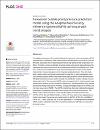On the Error Performance of Non-orthogonal Multiple Access Systems
Abstract
Unlike orthogonal multiple access schemes, non-orthogonal (NOMA) ones have arisen as an appealing solution to meet the requirements of the upcoming era of massive connectivity. In NOMA schemes, users are allowed to restrainedly interfere. Therefore, NOMA's ability to serve a number of users more than the number of available orthogonal channels has attracted tremendous research efforts in its different performance aspects. However, its error rate performance has not been sufficiently addressed yet. The currently available derived bit error rate (BER) formulas are either assuming ordered users based on their instantaneous channel gains or fit for special cases only. In this paper, assuming that the users are ordered in terms of the average channel gain and considering arbitrary number of users and modulation order, the average pairwise error probability (PEP) of downlink NOMA systems under Nakagami-m fading channels is derived. Both detection rules, maximum likelihood and successive interference cancellation, have been considered. The derived average PEP is then used to obtain the asymptotic diversity gain and an upper bound on BER using union bounding technique. Simulation results validate the accuracy of the derived formulas over different setups.
Collections
- Electrical Engineering [2840 items ]
Related items
Showing items related by title, author, creator and subject.
-
A reservoir bubble point pressure prediction model using the Adaptive Neuro-Fuzzy Inference System (ANFIS) technique with trend analysis
Alakbari, Fahd Saeed; Mohyaldinn, Mysara Eissa; Ayoub, Mohammed Abdalla; Muhsan, Ali Samer; Hussein, Ibnelwaleed A. ( Public Library of Science , 2022 , Article)The bubble point pressure (Pb) could be obtained from pressure-volume-temperature (PVT) measurements; nonetheless, these measurements have drawbacks such as time, cost, and difficulties associated with conducting experiments ... -
Average ber of multihop communication systems over fading channels
Hasna , Mazen ( IEEE , 2003 , Conference)Multihop transmission is a way to attain broader coverage by splitting the communication link from the source to the destination into several, possibly shorter links/hops. This paper presents an expression for the moment ... -
Asymptotic BER analysis of FSO with multiple receive apertures over M-distributed turbulence channels with pointing errors
Yang L.; Hasna , Mazen; Gao X. ( Optical Society of American (OSA) , 2014 , Article)In this paper, we consider a free-space optical (FSO) communication with multiple receive apertures over M-distributed turbulence channels with pointing errors. In particular, we consider two different combining schemes ...


